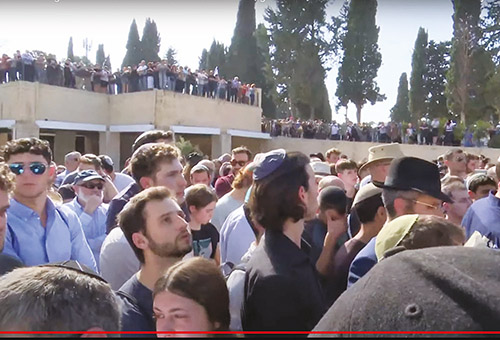
When Elan Ganeles, a dual American Israeli citizen, and a brilliant graduate of Columbia University, was murdered on February 27, the story figured prominently in the international media for but a few days. It’s been about 30 days since then—shloshim–a critical marker in a year of mourning. It is time to revisit his story, the widespread grief at his passing, and what his brief life meant, and could have meant, were he still with us.
Elan, from West Hartford, Connecticut, was shot on the highway on his way to the wedding of a close friend. On March 1st, he was laid to rest in Ra’anana’s cemetery, in a memorial service and interment attended by thousands, the majority of whom had never met him. The first few days were replete with media reports, in a flurry of sound bites by friends and rabbis. There were multiple interviews with Elan’s brothers Gabriel and Simon, accompanied by Rabbi Tuvia Brander of the Young Israel of West Hartford. There was considerable repetition in the coverage, across media—and then the flurry became a trickle and dissipated.
There was far more about Elan that the media could have offered us in the days following the initial reports. Regardless, his shloshim provides an opportunity for a more expansive portrait of this mensch par excellence, whose humanity touched so many people’s lives in a profound way. For me, the catalyst for my limited understanding of Elan was his parents.
I left West Hartford in 2003, when Elan was about six, and so my personal knowledge of him is anecdotal. In part, it’s inferred from the chesed/kindness of Drs. Carolyn and Andrew Ganeles, his bereaved parents and role models, my children’s doctors, and longtime members of the Young Israel community.
The shock at the news of his murder morphed into tears as I watched the funeral, broadcast on Zoom. The emotional impact of those experiences was far less visceral than the shiva-condolence call that I made on the following Sunday. The uneventful train ride to West Hartford did not prepare me for the visit my friend Judith and I were to make to the Ganeles’ home. Despite a pervasive distress, the somber overlay of Elan’s untimely death, and many unanswered questions, the outpouring of support to the Ganeles family was immediately palpable.

We parked near the Ganeles home, adjacent to 20-30 cars, with multiple out-of-state license plates. On the concrete path to the Ganeles’ home, I stopped for a moment to speak to Rabbi Brander, who had traveled to Israel with the family for Elan’s funeral and had helped Elan’s brothers to navigate the media blitz. Rabbi Brander shared that West Hartford’s Mayor Shari Cantor had sent his own family Shabbat dinner, an acknowledgment that as the Rabbi had done so much for others, it was time to do something to help him.
After skirting people gathered in front of the house, Judith and I entered. It was only about a half-hour before Mincha, the afternoon prayer with the Mourners’ Kaddish, and so there was limited time to offer consolation to the family. The small foyer and the living room were packed, nearly wall to wall with chairs. There was nowhere to sit, and barely any standing room. The crowd was a mélange of dress styles, ethnicities, and religious observances. People who never met Elan and his family came just because they heard what happened. We stood at the back, waiting for some people to stand, say the traditional message of consolation to the mourners, and then leave. When they did, we sat immediately facing both Drs. Ganeles. Gabriel and Simon were elsewhere in the room. As steeped in grief as Carolyn was, and facing an overflowing living room, she turned and told me that she thought she had seen me the previous month. “No,” I responded to her, “It’s been at least several months–probably not since the summer.” How could a woman in her situation care about my last visit to her community? That’s what the Ganeles family is like.
During Mincha, followed by Maariv, the evening service, the women gathered on one side of a sofa, the men on the other. Carolyn occupied the outermost chair at the front of the women’s area. I sat behind her as she recited the Mourners’ Kaddish—the memorial prayer—as did Andrew and their sons from the men’s area. It’s a prayer no parent ever wants to say.

After a brief recess, Rabbi Brander reconvened everyone for the evening prayers, and again, the family recited Kaddish. Then, in a compassionate gesture, Rabbi Brander requested that those present recite HaMakom Yerachem, the prayer of consolation, in unison, rather than individually, so that the family could eat dinner before evening visitation would begin.
Perhaps, to the outsider, this all sounds mundane, but for a mourner, the support provided during shiva buffers what follows, when individuals and families confront their loss alone. Elan’s tragic death is an incomprehensible loss not only for his family, community, and many friends, but also for those worldwide who might have benefited from his inquisitiveness, immense talent for innovation, and contributions to sustainability. And then there is his unbounded love for Israel and commitment to its future.
The loss of Elan is also an immeasurable loss for Israel, where that inquisitiveness, talent, and innovation would have flourished. His senseless death snuffed out the limitless potential of a unique individual, whose whole life was predicated on abundant kindness and concern for others. How else can one characterize a young man who carried around a list of 100-plus people with whom he felt responsible to stay connected?
In contrast with a world where glitz, bling, and fluff get the accolades, Elan Ganeles’ world—curiosity, wonder, and chesed—was authentic. May his memory be for a blessing and may his family continue to find comfort in his legacy of caring.
By Rachel S. Kovacs © 2023









